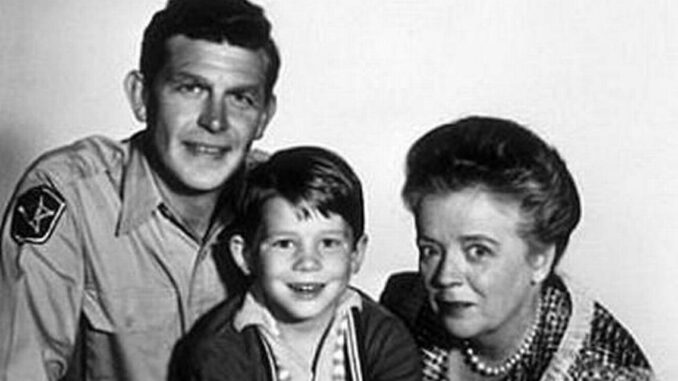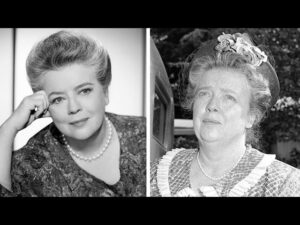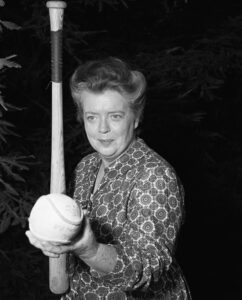
Frances Bavier’s portrayal of Aunt Bee on The Andy Griffith Show is iconic, remembered for her warm, caring, and gentle nature. Yet, behind the scenes, Bavier was not always as easygoing as her character. Known for her occasional moodiness, Frances Bavier had a subtle yet noticeable “tell” when she was feeling angry or disturbed. This unique detail about her behavior offers fascinating insight into the woman behind one of television’s most beloved characters.
In this article, we dive deep into Bavier’s time on the show, her unique quirks, and how her real emotions occasionally seeped into her portrayal of Aunt Bee. Let’s explore what made this actress truly unforgettable both on and off the screen.
Why Frances Bavier’s ‘Tell’ Matters to Fans of Classic TV
For fans of classic TV, details about actors’ personalities add depth to the characters we love. Bavier’s tell is a reminder that even the warmest characters can have a complex real-life side. Her behavior on set provides a behind-the-scenes look that fans crave, showing how a personal quirk shaped one of Mayberry’s most memorable characters.
Who Was Frances Bavier?
Frances Bavier wasn’t just Aunt Bee; she was a trained stage actress with a long list of acting credits before landing her role on The Andy Griffith Show. Born in 1902 in New York City, she trained at the American Academy of Dramatic Arts and performed in both Broadway plays and film before making her way to Mayberry. Her extensive experience made her one of the most seasoned actors on the show, yet her serious approach sometimes clashed with the laid-back atmosphere of the series.

Aunt Bee’s Role in ‘The Andy Griffith Show’
Aunt Bee Taylor, as portrayed by Bavier, was the perfect blend of warmth, humor, and occasional stubbornness. She moved to Mayberry to help her nephew Andy and quickly became a motherly figure to young Opie. Known for her delightful cooking and heartwarming wisdom, Aunt Bee’s character brought stability and a touch of home to the fictional town of Mayberry.
But unlike her character, Bavier wasn’t always as calm or cheerful in real life.
Frances Bavier’s “Tell”: How You Could Tell She Was Upset
Bavier was a highly professional actress, and most cast members respected her work ethic. However, her mood was occasionally affected by the pressures of filming. Her “tell” — a unique way she acted when upset or disturbed — was reportedly a subtle shift in behavior. According to those who worked closely with her, she would become quieter, withdrawing into herself.
What Triggered Bavier’s Tell?
Several factors could set off Bavier’s mood. As a seasoned actress, she had high standards for her work and sometimes grew frustrated if scenes didn’t go as she envisioned. Minor disagreements with other cast members or differences in acting style were occasional triggers. Bavier was also known to value privacy, which sometimes clashed with the open, friendly atmosphere on set.
How Bavier’s Tell Impacted Her Role as Aunt Bee
Interestingly, Bavier’s emotions sometimes bled into her portrayal of Aunt Bee. Fans of the show may notice subtle differences in Aunt Bee’s demeanor in certain scenes, likely influenced by Bavier’s mood at the time. While this never compromised her performance, it added an unexpected layer of authenticity, making Aunt Bee’s character feel even more real and relatable.
Aunt Bee: The Backbone of Mayberry
Despite her off-screen quirks, Bavier’s dedication to the role of Aunt Bee never wavered. She brought life to the character, making her one of the most beloved figures in Mayberry. Aunt Bee’s strength, compassion, and occasional frustrations made her feel like a real family member to audiences, who saw in her both the joys and challenges of family life.
How Cast Members Responded to Frances Bavier’s Tell
The other actors on The Andy Griffith Show respected Bavier’s experience and skill, and many adjusted their approach when they noticed her tell. Some, like Andy Griffith, understood that Bavier valued a certain level of professionalism and allowed her the space she needed when she seemed upset.
Frances Bavier’s Legacy on ‘The Andy Griffith Show’
Even with her quirks, Bavier’s contribution to the show was invaluable. She embodied the character of Aunt Bee so fully that fans often found it difficult to separate the actress from the character. Aunt Bee became synonymous with warmth and kindness, a feat that would not have been possible without Bavier’s dedication.
Did Frances Bavier’s Personality Affect Her Relationships with Cast Members?
Yes, to some extent. Bavier’s sometimes intense personality meant she didn’t always form close friendships with her co-stars. Don Knotts, who played the lovable Deputy Barney Fife, was reportedly cautious around her, aware of her “tell” and knowing when to give her space.
The Unlikely Bond Between Aunt Bee and the Audience
Despite her differences with some of her castmates, Bavier’s portrayal of Aunt Bee resonated deeply with audiences. Her character’s warmth created a familial bond with viewers, who saw her as the heart of Mayberry. Bavier’s skill allowed her to balance Aunt Bee’s compassion with occasional tough love, making her a character that felt both real and inspiring.

Aunt Bee’s Influence on Generations of TV Viewers
Aunt Bee remains one of the most iconic female characters on television. The character represented a type of strong, independent woman that wasn’t often seen in media at the time. For generations of fans, Aunt Bee was more than a supporting character; she was the symbol of a safe, loving home.
Why Fans Find Frances Bavier’s Story So Fascinating
There’s an undeniable charm in learning that the actress behind Aunt Bee wasn’t exactly like her character. Bavier’s real-life quirks and occasional frustrations add depth to her legacy, showing that even beloved actors have complexities. It’s a reminder that the people we see on screen are human, with their own struggles and idiosyncrasies.
How ‘The Andy Griffith Show’ Would Be Different Without Frances Bavier
It’s hard to imagine The Andy Griffith Show without Aunt Bee. Bavier’s unique take on the character added a richness to the show’s dynamic, making Mayberry feel like a fully developed world. Without her, the show might have lacked the familial warmth that Aunt Bee so perfectly represented.
The Enduring Legacy of Aunt Bee and Frances Bavier
Today, Aunt Bee continues to be a beloved figure in television history, and Frances Bavier’s “tell” adds a fascinating dimension to her legacy. Her complex personality and dedication to her craft made her an unforgettable presence on The Andy Griffith Show.
Conclusion
Frances Bavier’s subtle “tell” when she was upset or disturbed is a small but intriguing part of her legacy on The Andy Griffith Show. This quirk adds depth to our understanding of both Bavier and Aunt Bee, showing that even the most iconic TV characters are shaped by the unique traits of the actors behind them. Bavier’s dedication to her craft, combined with her real-life complexities, has left a lasting impact on classic television, making Aunt Bee a beloved character for generations to come.
FAQs
1. Did Frances Bavier enjoy playing Aunt Bee?
Yes, but she had a complex relationship with the role. Bavier appreciated Aunt Bee’s warmth but sometimes felt frustrated by the character’s limitations.
2. How did Frances Bavier’s personality affect her relationships with her co-stars?
Bavier’s moodiness and occasional intensity led some co-stars to be cautious around her, though most respected her dedication to the role.
3. What was Frances Bavier’s background in acting before The Andy Griffith Show?
Bavier trained in classical theater and had extensive experience on Broadway and in film before joining the cast of The Andy Griffith Show.
4. Did Frances Bavier and Andy Griffith get along?
They had a professional relationship, but their personalities sometimes clashed. Despite occasional tensions, they maintained mutual respect.
5. Why is Aunt Bee still a beloved character today?
Aunt Bee represents warmth, compassion, and family values that continue to resonate with audiences, thanks to Bavier’s heartfelt performance.